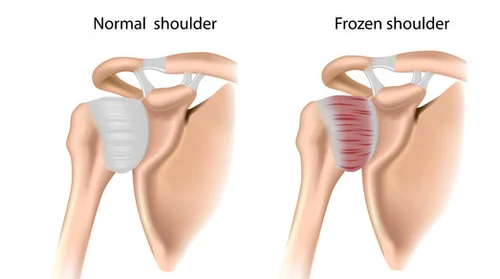
Frozen Shoulder
Frozen shoulder, also known as adhesive capsulitis, is a condition characterized by pain and stiffness in the shoulder joint. It typically develops gradually over time and can severely limit the range of motion in the affected shoulder. The condition most commonly affects individuals between the ages of 40 and 60, and it is more common in women than in men. While the exact cause of frozen shoulder is not fully understood, it is believed to involve inflammation and thickening of the shoulder capsule, the connective tissue surrounding the shoulder joint.
Having to keep a shoulder still for a long period increases the risk of developing frozen shoulder. This might happen after having surgery or breaking an arm.
Treatment for frozen shoulder involves range-of-motion exercises. Sometimes treatment involves corticosteroids and numbing medications injected into the joint. Rarely, arthroscopic surgery is needed to loosen the joint capsule so that it can move more freely.
Symptoms
Freezing stage
Any movement of the shoulder causes pain, and the shoulder's ability to move becomes limited. This stage lasts from 2 to 9 months.
Frozen stage
Pain might lessen during this stage. However, the shoulder becomes stiffer. Using it becomes more difficult. This stage lasts from 4 to 12 months.
Thawing stage
The shoulder's ability to move begins to improve. This stage lasts from 5 to 24 months.
Causes
- Age : Frozen shoulder is more common in individuals between the ages of 40 and 60.
- Gender : Women are more likely than men to develop frozen shoulder.
- Diabetes : People with diabetes are at an increased risk of developing frozen shoulder, although the exact connection between the two conditions is not fully understood.
- Immobilization : Prolonged immobilization of the shoulder joint, such as following surgery or injury, can increase the risk of developing frozen shoulder.
- Other medical conditions : Certain medical conditions, such as thyroid disorders, cardiovascular disease, and Parkinson's disease, may also increase the risk of frozen shoulder.




